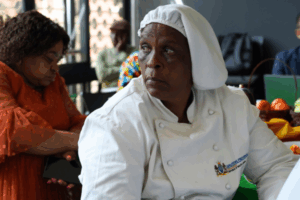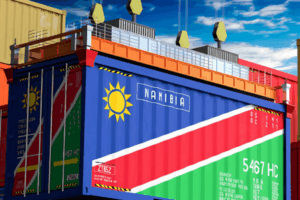Climate change is disrupting lives and deepening inequality. People marginalised by gender, age, income, or race are hit the hardest, yet they often have the least say in shaping the solutions.
Our article, Women and Just Transition: Risks and Opportunities, advocates for integrating gender analysis and a transformative approach into programmes and policy development. A just transition must empower women and marginalised groups to influence the policies that affect them and ensure they benefit from climate action.
LRS applied these principles in our partnership with the Friedrich Ebert Stiftung (FES) South Africa in 2024. FES commissioned a gender analysis for their project, Just Transition in Africa – Shaping Green Industrial Policy through Social Dialogue. We designed and facilitated online workshops for FES project staff. This article highlights key insights from that process, which contributes to our evolving thinking on trade unions and just transition.
What do we mean by a feminist just transition?
Gender-transformative means addressing the root causes of gender inequality to transform discriminatory norms and practices and overcome existing gender prejudices.
A gender analysis identifies and describes gender differences and relevance in specific contexts, and includes issues like gender-disaggregated or gender-sensitive data.
Feminism takes gender analysis further by identifying the way the system of patriarchal domination sees both our natural world and the work women do as infinite resources to be exploited. When nature is commodified and destroyed, it is women’s reproductive work that is relied upon to keep society functioning. Using a feminist analysis is to politicise the private realm and challenge the binary between public and private.
A feminist perspective challenges the idea that people are separate from, or superior to, the natural world. It is about recognising that the same oppressive gender, class and race systems we experience as humans are the systems that oppress nature. Lastly, it is about having a vision of a transition away from a consumption-based, extractive and exploitative economy.
What can a feminist perspective bring to the concept of a just transition?
Just transition originates from the trade union movement where the focus is on ensuring justice for workers displaced by environmental and climate changes. Just transition includes labour demands for greener jobs, social protection for workers and retraining. A feminist perspective recognises that transitions impact on people differently depending on their class, gender, race, etc. Energy systems, for example, have historically been male-dominated, with women having limited access to decision-making and control. The question is, would this unequal power relation change with a just transition?
A feminist perspective challenges the notion that a just transition can be limited to include a few benefits for women to satisfy some gender quotas. Rather it challenges the dominant development model based on extraction and exploitation of resources and advances the notion of a caring rights based economy that recognises, values and guarantees the importance of care as fundamental to well-being.
Mainstreaming a feminist perspective into union programmes and advocacy
Working with an intersectional power analysis
The trade union mandate to represent the interests of workers is crucial in exposing and challenging the power hierarchies of classism. However, unions often struggle to achieve similar success with other forms of oppression, such as patriarchy, racism, and sexism, which are typically relegated to gender or equity committees. A just transition requires a genuinely intersectional approach to confront all forms of hierarchical power abuse, including the exploitation of the earth’s natural resources. An intersectional power analysis should not only be limited to gender committee meetings but must also be integrated into what are often ‘’high level’’ male-dominated Just Transition discussions. This integration is vital for strengthening a transformative approach to the concept of a Just Transition.
Plurality and inclusivity are essential when using a feminist lens
There is no one single definition of what a just transition looks like, but central to any approach or model is the striving for systems change with economic and gender justice at the heart of the change. Many alternative economic models promote transformative change, yet these models are dismissed as ridiculous by those in power who support dominant, exploitative economic systems.
One such alternative model is the concept of a circular economy, where production and consumption involve sharing, gifting, swapping, leasing, renting, reusing, repairing, refurbishing, and recycling existing materials and products for as long as possible. This approach extends the life cycle of products and emphasises minimising waste. In contrast to a circular economy, a linear economy involves plundering raw natural resources, transforming them into products, and ultimately disposing of them. A circular model aims to bridge the gap between production and the natural ecosystems’ cycles on which humans ultimately depend.
Opening our minds to alternative economic models assists us in putting a spotlight on groups of workers who are generally regarded as on margins, for example, waste pickers involved in recycling who play an important role in reducing environmental pollution. Being open to alternative economic models like a circular economy can support unions in advocating for both the rights of waste pickers and the value they contribute to society.
Strengthening collaboration and alliances with climate justice movements
Solidarity has the power to drive transformative political visions and actions. A feminist perspective brings the concept of intersectional solidarity, where diverse voices are included and amplified.
For solidarity between the labour and climate justice movements to be truly transformative, it must be built from the ground up, with all groups standing on equal footing. We would need to recognise and address the unequal power dynamics between, for example, male mine workers in formal, unionised employment and women in the surrounding mining communities engaged in informal work. Both groups are affected by environmental degradation and climate change, but their experiences and access to power are vastly different. Organised, full-time male workers are far more likely to be heard and to benefit from just transition policies than women in insecure, informal jobs. A feminist just transition demands that these imbalances be acknowledged and addressed, so that no one is left behind.
Integrating indigenous knowledge into solutions to the climate crises
What would it take for unions to strengthen indigenous knowledge systems that value the environment? The devaluation of knowledge and education systems that was integral to colonialism is one reason why indigenous knowledge, for example, is still not appropriately integrated into solutions to the climate crisis.
Standpoint theory is a feminist perspective that challenges the objectivity of traditional science and knowledge and argues that we need to turn to marginalised groups who often hold crucial knowledge. One example is elderly people who are disproportionately exposed to environmental challenges but who are also the holders of expertise on forest resources.
Recovering an appreciation and valuing of one’s own indigenous knowledge systems in a supportive and affirming environment can be an important process of challenging the alienation many workers experience in their day-to-day work processes.
Championing the Just Transition through locally led initiatives
Sharing lived experiences of unions and community groups championing just transition and highlighting the importance of their bottom-up solutions. This could include collective agreements, occupational safety and health measures, and community-driven agro-ecological processes and practices.
Grounding the analysis in the context and experience of unions
A feminist analysis must begin by understanding how unions are engaging with just transition discussions, what struggles are being waged, what lessons have been learned, and what questions union members are asking. Feminist popular education methodologies can help generate actionable recommendations to enhance gender equity in the socio-ecological transformation. But this process must be rooted in the specific national contexts and lived experiences of trade unions. It can only be developed collectively through participatory action learning, where unions are supported with the intellectual and practical resources needed to analyse their own realities.
Peer learning exchanges between unions and climate justice activist groups
Drawing on a diversity of experiences will be important in challenging any narrow conception of a Just Transition as only a workplace struggle for jobs and retraining. Community-based climate justice activists will be able to share their experience in mobilising, organising and litigation.







